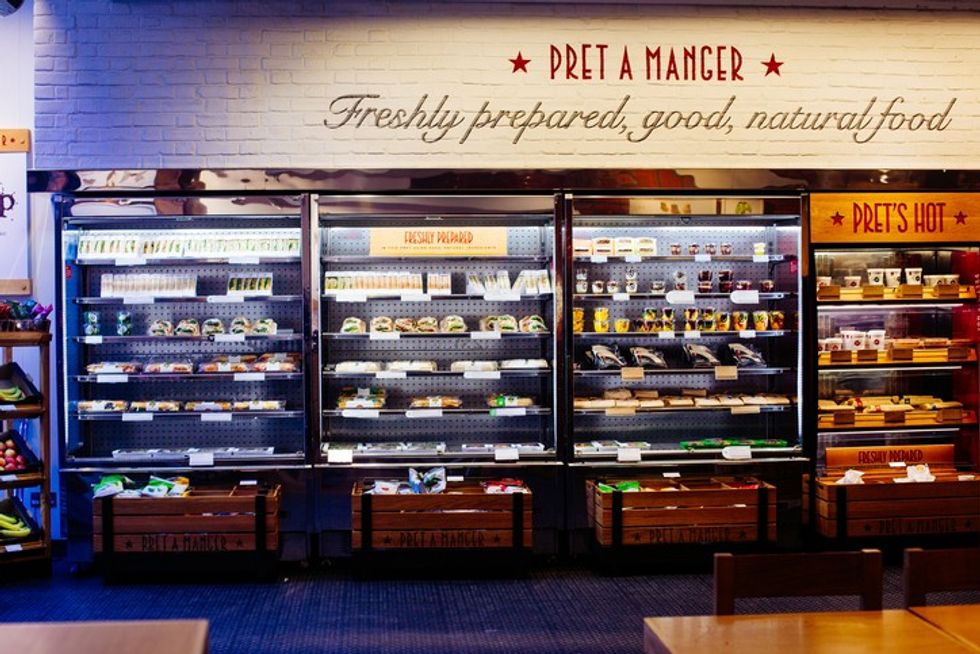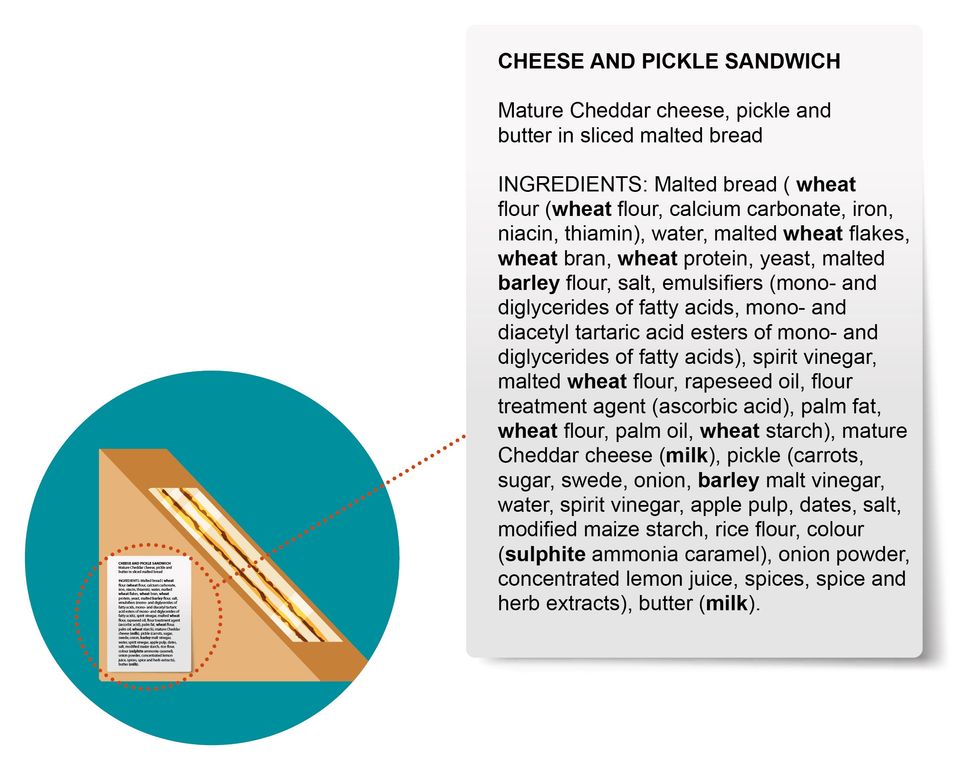With one in four Britons said to be living with allergies, the newly-implemented Natasha’s Law is deemed a big moment in the history of food safety. Experts claim that on average ten people in Britain die every year from food-induced anaphylaxis, of which a significant percentage are triggered by food allergies.
Since there is no cure for food intolerance or allergy, those who suffer from these conditions have to observe a strict avoidance diet, where a minor slip-up of might result in a drastic, sometimes even fatal turn of events.
From October 1, a new food allergen law, popularly known as Natasha’s Law, has come into effect in England, under which prepacked for direct sale (PPDS) food needs to be labelled with the full list of ingredients and allergens. As of now, the law is applicable in England and will not be legally required in Scotland, Wales, and Northern Ireland. That said, once the impact of the legislation is apparent, it’s likely that the rest of the UK will follow suit.
There was a lot of confusion earlier regarding this amendment when it was introduced. A research paper published in early September surveying 500 food industry employers and employees commissioned by global standards organisation GS1 UK found that 40 per cent of businesses had not yet heard of Natasha’s Law. It also found that 80 per cent of those surveyed felt unprepared for the new legislation.

Food Standards Agency (FSA) spokesperson emphasised how the new law is very much applicable to convenience store owners, who offer food-to-go, as well.
“The new law applies to any business which sells food which is packaged at the same place it is offered or sold to consumers and is in this packaging before it is ordered or selected. For example, if you package and sell sandwiches on the same site in a shop these will now need to be labelled with an ingredients list with any of the 14 major allergens emphasised in the list,” FSA spokesperson told Asian Trader.
“It can include food that consumers select themselves – from a display unit, for example - as well as products kept behind a counter and some food sold at mobile or temporary outlets.”
It is clear now that the law does have a huge role to play in the retail environment as well.
So if a retailer offers sandwiches, burgers, cupcakes or any other forms of food-to-go, you will need to abide strictly by the new labelling rules. It is absolutely vital that any information about food allergens is printed, clearly displayed on packaging, and does not rely on verbal communication only.
Jon Taylor, Mutual Manager of The Retail Mutual reiterated that Natasha’s law will affect any business which provides food prepacked for direct sale or PPDS.
"If this applies to your business you must comply with the new allergen labelling laws, introduced with effect from 1st October 2021. The Food Standards Agency provides labelling guidance for PPDS foods and an online tool to help businesses understand how the law will impact their operations," he said.
Apart from stores selling food-to-go, the new law is also applicable in a range of businesses including fast food outlets, takeaways, bakers, butchers and market stalls.
If still confused, the FSA spokesperson advised everyone to visit the dedicated PPDS Hub online which has a checker tool that businesses can use to see if they are affected.
Background on Natasha’s Law
Before Oct 1, only pre-packed food and drinks that are prepared “off site” needed to be clearly labelled with an ingredients list and with allergen information emphasised.
The law was introduced in 2019 following the tragic death of teenager Natasha Ednan-Laperouse, who suffered a fatal allergic reaction after eating a baguette bought from Pret a Manger.
The packaging for the fatal baguette contained no allergen details, since pre-Oct 2021 laws did not require food prepared on-site to be labelled with such information. Natasha innocently assumed it was safe, being unaware that the baguette contained sesame seeds, which unfortunately resulted in a severe allergic reaction and her subsequent death.

But from a legal standpoint, Pret a Manger was not required to provide allergen information on a freshly made, non-pre-packaged food.
Following the teenager’s death, her parents campaigned for a change to the law to better protect allergy sufferers. It was due to their relentless efforts the government agreed that stronger laws should be implemented to protect those with food allergies and give them greater confidence in the food they buy.
Natasha’s parents – Nadim and Tanya Ednan-Laperouse – told Asian Trader how their campaign for a new labelling law was about saving lives.
“Natasha’s Law marks a major milestone in our campaign to support the two to three million people in this country living with food allergies. Food allergies can be fatal – and the number of people, particularly children, being diagnosed is rising. The introduction of Natasha’s Law is vital to help protect people with food allergies from life-threatening allergic reactions. This is about saving lives,” they said.
“This change in the law brings greater transparency about the foods people are buying and eating. It will give people with food allergies confidence when they are buying pre-packaged food for direct sale such as sandwiches and salads. Everyone should be able to consume food safely.”

Now that the law has come into effect and people are realising its importance, it now seems that there was always a glaringly obvious need for such a mandate.
“The coroner’s verdict was articulated perfectly, the loophole in the food law was being misused. The coroner also stated that the baguette containing hidden sesame seeds that Natasha consumed, had it been properly labelled, she would not have eaten it. Natasha would not have died. We have to live with that reality every day,” said Natasha’s parents.
David Pickering from Chartered Trading Standards Institute, which represents trading standards professionals working in the UK, pointed out how the new law will touch the lives of every Briton for good. He also admits the gap was always there.
“The practical issue was that either consumers felt it too difficult to ask for the information or if there was a big queue in a shop they again felt awkward or felt they didn’t want to hold people up. There was also sometimes a gap in the food business ability to convey correct information properly to consumers,” he told Asian Trader.
How to Label
Just to reiterate, the following information must, by law, now should be displayed on the label:
- Name of the food: This must be clearly stated and not misleading. If the food has been processed in some way, then this must be stated for example, smoked bacon.
- List of ingredients: The ingredients must be listed in the order of the weight with the greatest first.
- Allergen information: Where one of the 14 major allergens are present as highlighted earlier in this article then they must be declared by law. The allergens must be emphasised in the ingredients list, the most used emphasis is bold lettering, or through contrasting colours or underlining them.

Although customers may be intolerant or allergic to other ingredients, the following 14 allergens must be declared as by current UK food laws.
- Celery
2. Cereals containing gluten (oats and barley)
3. Crustaceans (crabs, lobster, prawns)
4. Eggs
5. Fish
6. Milk
7. Lupin
8. Molluscs (oysters and mussels)
9. Mustard
10. Sesame
11. Peanuts
12. Soybeans
13. Sulphur dioxide and sulphites (for concentrations above ten parts per million)
14. Tree nuts (almonds, walnuts, Brazil nuts, hazelnuts, pecans, cashews, macadamias, and pistachios)
Where it is not easily identifiable by the ingredient name that there is an allergen present, for example, tofu, then next to the ingredient the name of the allergen must be stated, to illustrate this, e.g “tofu (soya)”.
Penalty and Appeal
Food and beverage independent distributor ShelfNow feels that though small retailers have already had to do huge amounts of work during the pandemic to comply with Covid-19 and this can feel like an extra burden for many, the compliance is still necessary and inescapable.
“Essentially, if you package food on your site for customers to buy, you’ll need to make sure you're compliant with the new regulations, no matter the size of your business. If you already buy your packaged food from another supplier, it does not count as PPDS but products will still need to include a full ingredients list and allergen highlighting on-pack,” said Philip Linardos, co-founder and CEO of ShelfNow- which is also a member of the Association of Convenience Stores and has played a key role in supporting retailers ahead of Natasha’s Law.
While it is clear that the new legislation asks for investment and extra staff time to label products according to the law, the consequences of not complying are dire, with possible fines and risk to customer safety as well as reputational damage.
Compliance with the law will be checked during routine food inspections by local authority officers, said an FSA spokesperson, who added that just like any other food safety concern, people can report breaches of the law to the food team at their local authority who will then investigate the matter.
Compliance with the law will also be checked during “routine food inspections by local authority officers” although they may also visit food businesses “just to check this new compliance with the PPDS requirements”, said the spokesperson.

Failure to provide the correct allergenic information on PPDS constitutes an offence and may result in a criminal prosecution. Such a failure may be prosecuted as an offence contrary to regulation 10 of FIR (as amended) or regulation 19 of the Food Safety and Hygiene Regulations 2013.
The FSA says that if the local authority officer finds “significant problems”, they may carry out a full investigation. This will normally involve the owner of the food business being invited to a formal interview with council officers. This will give them the opportunity to explain the problems that were found at the business. The local authority will consider all the evidence and facts before deciding whether to prosecute the business for non-compliances, informed FSA spokesperson.
“In deciding what action to take, local authorities will consider the nature of the breach, such as the severity of any breaches and how many products are incorrectly labelled, and the history of compliance. In the most serious cases, food business owners could be prosecuted by the local authority and be given a potentially unlimited fine or even a prison sentence by a court,” the FSA spokesperson clarified.
Challenges and how to prepare
This new legislation means that food businesses of all sizes have a legal obligation to implement some sort of labelling system. Although big firms can afford the luxury of electronic labelling systems, smaller retailers are left to print their own labels with some resorting to handwritten ingredient lists.
The challenges that Natasha’s Law presents also include staff-training on ingredients and labelling, the expenses related to training and labelling, and the time it takes to label individual products. Small and medium c-store owners may struggle with the costs of implementing all of these factors as well.
Mos Patel, owner of Family Shopper in Ashton and Premier store in Oldham as well as the winner of Food-To-Go Retailer of the Year accolade at the 31st Asian Trader Awards, admits that making this transition was not easy but now that the law has come into effect, adhering to it is paramount in his day-to-day business.

“We are making sure that every item in our food-to-go is well labelled, including cakes and sandwiches. We are printing labels as per the norms issued by the government though it is a manpower-consuming and time-taking exercise, almost two hours monthly if you see it that way,” he told Asian Trader, adding that he is still making sure nothing from his stores’ food-to-go sections goes unlabelled.
Both the FSA spokesperson and Pickering pointed out that there is a lot of guidance on the internet produced by the FSA and other organisations.
“Some local authorities offer free business advice but some charge for it. Even if your local authority charges it is a price worth paying to ensure you sell food legally,” Pickering said, adding the bottom line that, “if you pack and sell food on your premises, you need to ensure an accurate ingredients list on those products.”
Food and beverage independent distributor ShelfNow claims that it has seen its partners introduce a raft of new measures in recent months in anticipation of the new legislation. Staff training has also been stepped up to ensure that all front of house teams are briefed and can speak with confidence about prepared goods and any allergen ingredients that have been used in certain products, says the firm.
“The FSA is a useful guide for all things related to Natasha's Law. It's also created a handy tool to help you understand if you need to make changes and what you need to do. If you can’t adapt your current products to be compliant you’ll either need to change the products or buy packaged food from a compliant supplier,” Linardos told Asian Trader.
Conclusion
Some industry experts still feel that Natasha’s Law may not be a “silver bullet”. What happens if a printer breaks down or someone puts the wrong label on a sandwich? How is the system going to be policed? Who will check if labelling is correct? They are questions that only time will answer.
However, it is paramount that every worker in the store is allergen aware. There are multiple providers of allergen awareness training including one by Allergy UK that has extensive information and FSA guidance. It's critical that all staff, not just those involved in food preparation but everyone in the store, have a clear understanding of the importance of allergen labelling and what the regulations mean.
Natasha’s parents also urge everyone in the industry to take action to make sure they are compliant with Natasha’s Law.
“With people’s lives at stake, no food retailer wants to be on the wrong side of this issue,” they said, adding that more still needs to be done to support people in this country with food allergies. Their charity is now campaigning for “Allergy Tsar” to ensure people with food allergies receive correct and appropriate support, including joined up health care to prevent avoidable deaths and severe ill health.
Now that Natasha’s Law is here, people with food allergies have found a new hope. Ultimately, lives will be saved, and the level of awareness around the importance of food allergen information will be elevated like never before.
For more information on PPDS, please visit the PPDS hub of the FSA website at www.food.gov.uk/ppds.


